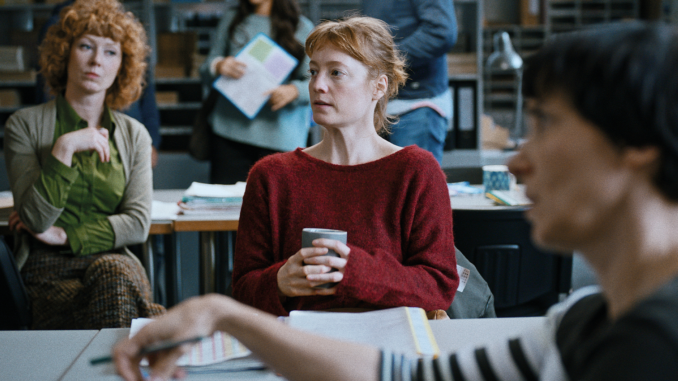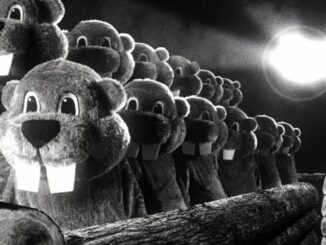
The Teachers’ Lounge suggests that teaching would be a noble and fulfilling profession, if not for all the students, their parents and fellow faculty.
The German film – a nominee for Best International Film at this year’s Academy Awards – is a tense story of good intentions giving way to disastrous consequences, Dead Poet Society with a more cynical – and sadly, probably more realistic – worldview. Although there is very little in the way of violence or upsetting imagery, it’s as suspenseful and stomach-clenching as any Hollywood thriller.
Carla Nowack (Leonie Benesch) teaches kids at a public school in Germany. By all accounts, she’s good at it, and her students like her. They seem engaged; she’s friendly and encouraging, although quick to gently point out if they’ve missed the mark. She’s committed to a fair and democratic classroom, and she advocates for her students. This latter aspect comes into play when, after a rash of petty robberies at the school, the administration oversteps its bounds in searching for the culprit, including accusing a young Turkish boy of stealing the money (his parents clarify he was given money to buy a video game).
Frustrated – and, frankly, suspicious of her own fellow faculty members – Carla leaves her laptop’s webcam on when she leaves the teachers’ lounge. When she comes back, not only does she find her money missing, but she has a small visual clue that she believes easily leads her to the culprit. When she attempts to confront the thief, looking only for the cash to be returned and an apology, the situation quickly spirals out of control; not only is the suspect indignant, embarrassed and offended, but Carla may also have compromised her coworkers’ privacy by videotaping the crime.
From there, things fall spectacularly apart in ways that would not be fair to spoil. Suffice to say that the school has its own way it wants to see the situation end, and there are ripple effects for one of Carla’s students. Carla finds her own desires to provide clarity, insight and solutions stymied by her own lack of assurance about what she might have actually witnessed, the unpredictability of young students, and the rigidity of the academic system.
This might sound too low stakes to thrill or too dismal to be enjoyed, but it’s neither. Director Ilker Çatak and editor Gesa Jȁger let the film unfold like a thriller; it’s tense and unpredictable, but there’s also an undercurrent of dark humor that accompanies every pitfall Carla finds herself in (an interview with the student-run newspaper is particularly well-handled). The script by Çatak and Johannes Duncker is smart and deft; the film gains a great deal of suspense because its point of view is only limited to Cara. We’re privy to what she sees, but the film is aware that the teacher – who, in early scenes, talks about the importance of evidence and investigation – has no ironclad proof regarding the event; her video evidence is compelling, but not the final word. And several scenes capture Carla under suspicious or antagonistic eyes; fellow faculty members who distrust the way she’s handled the situation, parents lacking trust in their children’s teacher; kids’ who are quick to protect their own and take sides.
The film is anchored by Benesch’s smart, harrowing performance. Carla is a confident and creative teacher, and as the film opens, she’s enthusiastic about making a difference in her students’ lives and being a mentor. But as her every attempt to do the right thing blows up in her face, Benesch aptly captures the frustration, anger and exhaustion that plague the character. In the end, she’s stuck between a system that won’t bend and young minds she wants to mold, even if the free thought she’s encouraged now has her at their mercy.
The film at times appears to try to let the public school stand in as a metaphor for larger institutions and societal complications, and I don’t know if there’s quite enough meat on the bone for that to land. But when it’s focused only on its protagonist and the thorny ways in which none of her good deeds go unpunished, The Teachers’ Lounge is a riveting and well-crafted bit of suspense.

